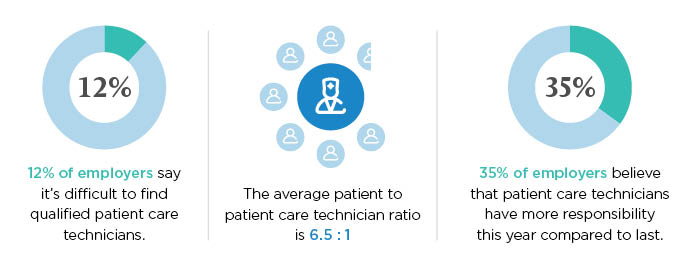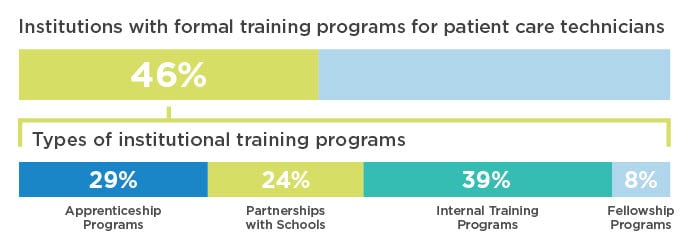Working in the frontlines of healthcare, patient care technicians (CPCT/A) assist nurses and other medical professionals. They keep close tabs on patients, and help them with basic needs, perform safety checks, check their vitals, and more.
We recently gathered insight and data from 162 healthcare employers to uncover factors that most impact the patient care technicians' pathway to success. Here are some of the key findings. For a full summary, download your PDF copy our 2020 Industry Outlook from the latest edition of accessTM: an allied health industry journal.
Patient care technicians are providing essential care to several patients each day on the job.
Patient care technicians care for an average 6.5 patients at a time at healthcare facilities, hospitals, and nursing homes. For comparison, the minimum nurse-to-patient ratio in California—the only state with legally defined ratios—varies from 1:2 to 1:6, depending on the unit. If you're drawn to help people, this role provides an opportunity to make an impact on a lot of lives.

Certification is often required, and employers say those who are certified are prepared for the job.
Of the employers we surveyed, 78% said they encouraged or required certification, and 62% report that newly-certified patient care technicians are prepared for their job duties. If you're motivated to provide hands-on assistance and make a difference in patients' lives, becoming a Certified Patient Care Technician/Assistant (CPCT/A) can help you on your career path. Plus, you could improve your earning potential. 63% of employers pay employees more when they earn their certification.

Nearly half of healthcare institutions have formal training programs for patient care technicians.
Not only do employers value training, 46% of them are sponsoring it through internal programs or partnerships. Of the healthcare institutions surveyed, 29% use apprenticeship—a model that's recently gained popularity in the healthcare sector—to train patient care technicians. These programs offer great opportunities to "earn while you learn", so you don't have to take time off work to advance your education.

Employers seek candidates who work well with patients.
It makes sense, given the close relationship patient care technicians have with their patients, that soft skills would be important. "Professionalism" and "verbal communication" were the top two desired soft skills identified by employers.
Patient care technicians are highly respected in the healthcare industry, which is made clear by how many institutions are investing in training individuals to fill this vital role.
Download an infographic that shares more statistics and trends on the patient care technician profession by clicking the button below.
If you'd like to learn more information about becoming a Certified Patient Care Technician/Assistant (CPCT/A), visit nhanow.com.


